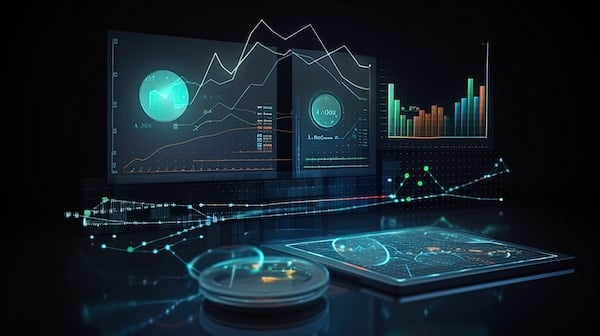Published on
Empowering Education Through Data Science: Unleashing the Potential of Data-Driven Insights

In today’s digital age, data science has emerged as a powerful discipline that encompasses the extraction of valuable insights from vast amounts of data. It combines statistical analysis, machine learning and data visualization techniques to unlock hidden patterns, trends and correlations. Data science has proven to be a transformative force across many industries, and the field of education is no exception. By harnessing the power of data-driven insights, educators can revolutionize teaching and learning practices, leading to enhanced educational outcomes and informed decision-making. This article explores the pivotal role data science can play in education, providing detailed examples of its applications, while emphasizing the importance of data privacy and ethics in analyzing student data.
Personalized Learning: Tailoring Education to Individual Needs
Personalized learning is a prime area where data science makes a significant impact. By analyzing vast amounts of student data, including academic performance, engagement levels and learning preferences, educators gain deep insights into individual learning patterns. These insights inform the design of tailored educational content and interventions, optimizing student engagement and achievement. For instance, machine learning algorithms can recommend personalized resources and adaptive learning platforms that dynamically adjust the difficulty level and content of lessons based on individual student progress. This personalized approach ensures each learner receives a customized educational experience, leading to better knowledge comprehension and retention.
Early Identification of At-Risk Students: Proactive Interventions for Student Success
Another valuable application of data science in education is the early identification of at-risk students. By leveraging historical data such as attendance records coursework completion rates and socioeconomic backgrounds, predictive analytics models can identify students who are likely to struggle academically. This early identification allows educators to intervene proactively, providing targeted support and resources to help these students succeed. For example, machine learning algorithms can predict the likelihood of a student dropping out based on various risk factors such as low attendance and poor grades. Armed with this information, educators can implement timely interventions and support mechanisms, improving student retention rates and overall academic success.
Curriculum Optimization and Instructional Strategies: Enhancing Teaching Practices
Data science also plays a crucial role in curriculum optimization and instructional strategies. By analyzing data on student performance, feedback and engagement, educators gain insights into the effectiveness of different teaching approaches. For example, data science techniques can be employed to analyze test scores and student feedback, identifying specific topics or concepts that students find challenging. This information guides instructional decisions, allowing educators to modify their teaching methods, restructure the curriculum or develop supplementary materials to better support student learning. Additionally, data science can enable the creation of interactive and immersive learning experiences that cater to diverse learning styles, fostering a more engaging and inclusive educational environment.
Intelligent Tutoring Systems: Personalized Guidance for Enhanced Learning
Intelligent tutoring systems represent another innovative use of data science in education. These systems leverage machine learning algorithms to provide students with personalized guidance and support. By catering to individual student needs, monitoring progress and offering targeted feedback and recommendations, intelligent tutoring systems create customized learning experiences. For instance, virtual tutors powered by data science can track a student’s performance, identify areas of struggle and offer tailored explanations and practice exercises. Through continuous support and personalized learning experiences, intelligent tutoring systems promote student success and foster a deep understanding of the subject matter.
Data Privacy and Ethical Considerations: Safeguarding Student Information
While the potential of data science in education is immense, it is essential to prioritize data privacy and ethical considerations. Educational institutions must establish robust data governance policies that outline guidelines for data collection, storage, access and sharing. To protect student data, it is important to adhere to relevant privacy regulations, such as The Privacy Act of Canada, the Personal Information Protection and Electronic Documents Act (PIPEDA), the General Data Protection Regulation (GDPR) and the Family Educational Rights and Privacy Act (FERPA) in the United States. These regulations outline guidelines for the collection, use and disclosure of personal information, ensuring student data is handled securely and with utmost confidentiality. By complying with these privacy regulations, educational institutions can instill trust in students and the wider community, creating a safe and ethical environment for data-driven educational practices.
In addition to compliance, data anonymization and aggregation techniques can be employed to protect individual identities while still enabling valuable analysis. By removing personally identifiable information and aggregating data at a group level, it is possible to derive insights without breaching privacy boundaries. This approach keeps individuals from being identified or targeted based on their data, while allowing researchers and educators to gain meaningful insights from the collective data set.
Furthermore, fostering a culture of data ethics is paramount. Educators and data scientists must prioritize the responsible use of student data, ensuring it is used solely for educational purposes and without bias or discrimination. Regular ethics training and ongoing discussions about data privacy and ethical considerations can help raise awareness and equip all stakeholders to make informed decisions regarding student data analysis.
In conclusion, data science holds immense potential for empowering education through data-driven insights. Personalized learning, early identification of at-risk students, curriculum optimization and intelligent tutoring systems are just a few examples of how data science enhances educational practices. However, as we harness the power of student data, it is crucial to prioritize data privacy, adhere to ethical practices and foster a culture of data ethics. By keeping these elements at the forefront, we can ensure data analysis in education is conducted responsibly, respecting individual privacy while unlocking the full potential of data-driven insight for the benefit of students and society as a whole.
Author Perspective: Administrator



